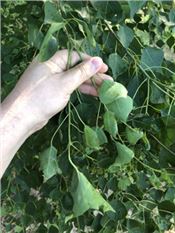Invasive Plant And Tree Identifiers Needed

The Arkansas Forest Resources Center’s Forest Health Laboratory is seeking help in their efforts to locate and document
invasive plants across the state. Invasive species, or “invasives,” are non-native species that result in ecological or economical loss
or damage. Invasive species are a growing burden on the economies of both Arkansas and the nation, with a $120 billion a year in economic cost.
Pictured: Tallow.Image courtesy Arkansas Forest Resources Center.
MONTICELLO, ARK.
Are you interested in identifying invasive plant species and trees? Do you want to use technology to document your discoveries? The Arkansas Forest Resources Center, Forest Health Laboratory is seeking help in locating and identifying invasive plants.
University of Arkansas at Monticello Associate Professor Mohammad Bataineh is asking outdoor enthusiasts to locate and make observations of the presence of invasive plant species. The project needs people willing to locate and make observations regarding invasive plant species. If you are willing to help identify, photograph and record information about plant species, then this project is right for you.
Bataineh said, “the project will focus on mapping and monitoring the distribution expansion of invasive populations.” Invasives are those non-native species that result in ecological or economical loss or damage. Invasive species are a growing burden on Arkansas’s and the nation’s economy with a $120 billion a year in economic cost.
Arkansans’ participation and contributions are of great value in protecting Arkansas forests and its resources. All observations will be verified and compiled into a shareable map. By using the iNaturalist app, you can check on how your observations are being used.
Participants will need a smartphone with internet access to a free app. If you are interested, please download the iNaturalist free app and create an account. Once registered, start logging observations and associate them with project "Invasive Plants of The Natural State" at https://www.inaturalist.org/projects/invasive-plants-of-the-natural-state.
Alternatively, you can email locations and or photos of your observations to foresthealth@uamont.edu, or physically mail it to: Arkansas Forest Resources Center, 110 University Court, Monticello AR 71656.
This work is supported, at least in part, by the USDA National Institute of Food and Agriculture, McIntire-Stennis project 1005987.
For more information, please contact foresthealth@uamont.edu. ∆